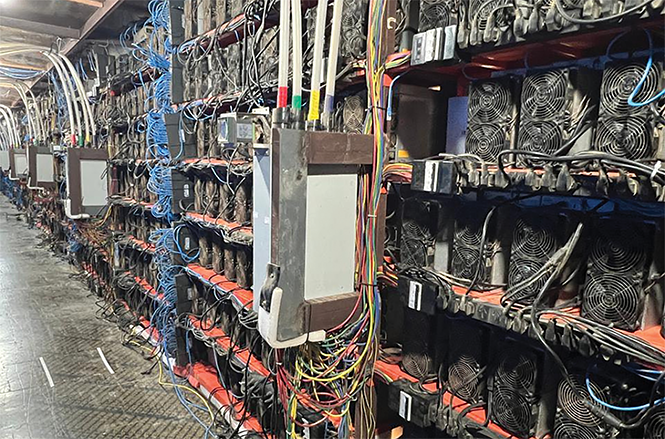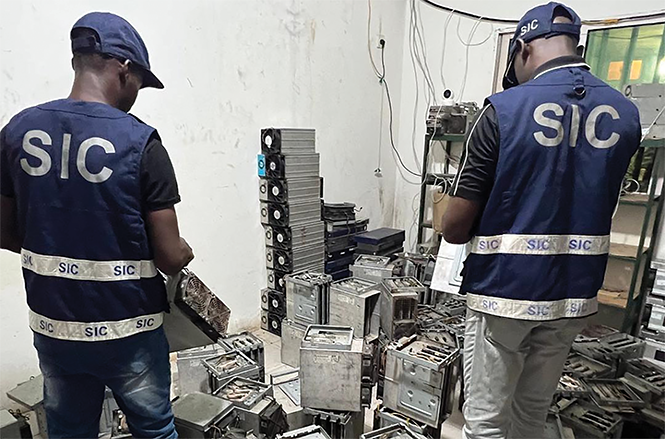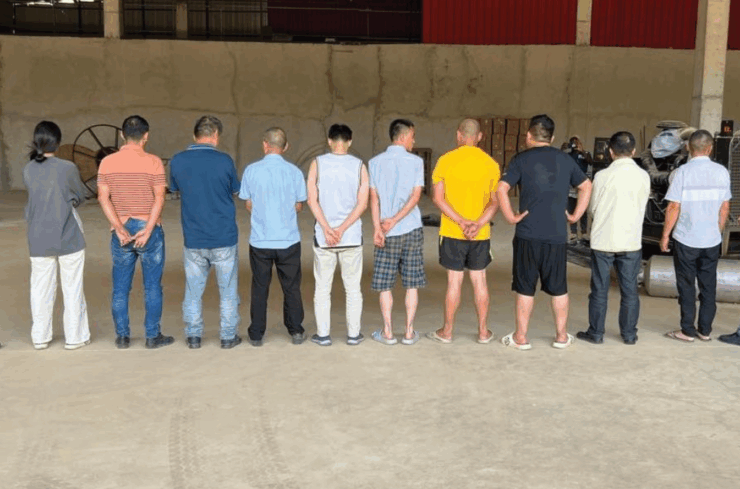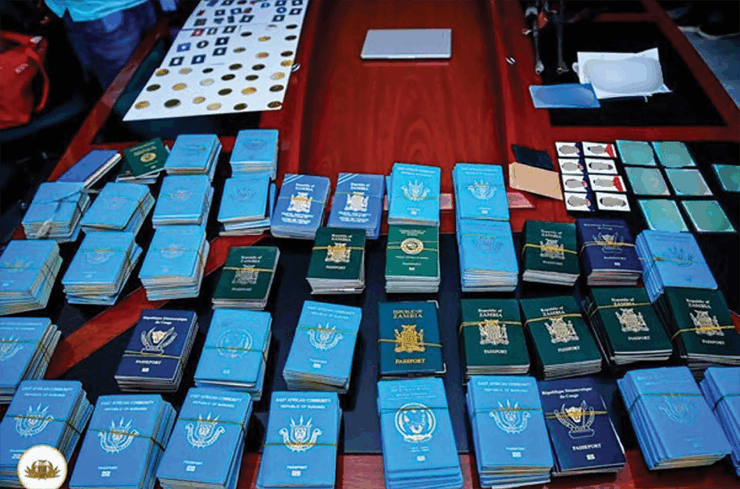RACKET: African states bust 1 200 suspects allegedly linked to cybercrime, fraud networks and recover millions…
By Monk Nkomo
More than one thousand two hundred cyber criminals targeting nearly 90 000 victims have been arrested in the past three months in a major crackdown coordinated by Interpol and comprising several countries across Africa and which resulted in the recovery of 97,4 million dollars.
Operation Serengeti 2.0, held under the umbrella of the African Joint Operation against Cybercrime, brought together investigators from 18 African countries and the United Kingdom to tackle high-harm and high-impact cybercrimes including ransomware and also dismantled 11,432 malicious infrastructures.
It comprised a consortium of law enforcement agencies dedicated to identifying and mitigating potential cybercriminal activity before it occurred. The International Cyber Offender Prevention Network (InterCOP), was led by the Netherlands and aimed to promote a proactive approach to tackling cybercrime.
The sweeping operation was conducted amid reports and data from Kaspercky – one of several private sector partners with Interpol’s cybercrime directorate – that suspected scam notifications rose up to 3000 percent in some African countries.
According to data from Trent Micro, ransomware detections in Africa also rose in 2024 with South Africa and Egypt suffering the highest number at 17,849 and 12, 281 detections respectively. They were followed by other highly digitized economies such as Nigeria (3459) and Kenya with 3030.
Incidents included attacks on critical infrastructure such as a breach at Kenya’s Urban Roads Authority and on government databases such as hacks of Nigeria’s National Bureau of Standards.
The operation, which netted 1209 cybercriminals between June and August this year, was strengthened by private sector collaboration, with partners providing intelligence, guidance and training to help investigators act on intelligence and identify offenders effectively.
Prior to the operation, investigators participated in a series of hands-on workshops covering open-source intelligence tools and techniques, cryptocurrency investigations and ransomware analysis.
This intelligence was shared with participating countries ahead of the operation, providing critical information on specific threats as well as suspicious IP addresses, domains and C2 servers.
Cybercrime accounted for more than 30 percent of all reported crime in Western and Eastern Africa. Online scams, ransomware, business email compromise and digital sextortion were the most reported cyberthreats.
A total 90 percent of African countries reported needing ‘significant improvement’ in law enforcement or prosecution capacity following reports that a growing share of crimes in Africa were cyber-related, according to Interpol’s 2025 Africa Cyberthreat Assessment Report. Online scams, particularly through phishing, were the most frequently reported cybercrimes in Africa, while ransomware, business email compromise (BEC) and digital sextortion also remained widespread.
Interpol Cybercrime Director, Neal Jetton ,said: “This fourth edition of the Interpol African Cyberthreat Assessment provides a vital snapshot of the current situation, informed by operational intelligence, extensive law enforcement engagement and strategic private-sector collaboration. It paints a clear picture of a threat landscape in flux, with emerging dangers like AI-driven fraud that demand urgent attention. No single agency or country can face these challenges alone’’.
Cybersecurity was not merely a technical issue – it had become a fundamental pillar of stability, peace and sustainable development in Africa, according to Acting Executive Director of Afripol, Ambassador Jalel Chelba. ‘’ It directly concerns the digital sovereignty of states, the resilience of our institutions, citizen trust and the proper functioning of our economies.’’
Business Email Compromise (BEC) -related incidents also rose significantly, with eleven African nations accounting for the majority of BEC activity originating on the continent. In West Africa, BEC fraud had driven highly organized, multi-million-dollar criminal enterprises, such as transnational syndicate Black Axe.
Africa’s Top Cyberthreats
·• INTERPOL-coordinated operation with authorities across Africa, arresting 1 209 cybercriminals who targeted nearly 88 000 victims;
• In the past year, suspected scam notifications rose by up to 3 000 per cent in some African countries, according to data from Kaspersky;
• Ransomware incidents in Africa also rose in 2024, with South Africa and Egypt suffering the highest number, at 17 849 and 12 281 detections respectively, according to Trend Micro;
• South Africa and Egypt were followed by other highly digitized economies such as Nigeria (3 459) and Kenya (3 030);
• Cybercrime accounts for more than 30 per cent of all reported crime in Western and Eastern Africa;
• Online scams, ransomware, business email compromise and digital sextortion are the most reported cyberthreats;
• 90 per cent of African countries report needing ‘significant improvement’ in law enforcement or prosecution capacity;
• Authorities in Angola dismantled 25 cryptocurrency mining centres, where 60 Chinese nationals were illegally validating blockchain transactions to generate cryptocurrency;
• Zambian authorities dismantled a large-scale online investment fraud scheme, identifying 65,000 victims who lost an estimated USD 300 million;
• Also in Zambia, authorities identified a scam centre and, in joint operations with the Immigration Department in Lusaka, disrupted a suspected human trafficking network. They confiscated 372 forged passports from seven countries.
African police leaders vow to enhance continental security
The three-day INTERPOL African Regional Conference closed in Cape Town today with a series of recommendations designed to enhance Africa’s capacity to fight transnational organised crime and terrorism.
Police leaders from across the continent addressed some of the most pressing security challenges facing Africa, including cybercrime, terrorism, financial crime and environmental threats. The conference resolved:
• Harness INTERPOL’s global expertise to combat cybercrime, particularly ransomware, online scams and digital extortion;
• Expand intelligence and data exchange between specialist units to identify high-value targets and disrupt criminal networks;
• Strength border controls with regional and international partners to disrupt the movement of illicit goods, smuggled persons, and terrorist suspects.
The conference also saw the creation of a new INTERPOL African Committee which will set future regional priorities and advise on crime threats and prevention strategies.
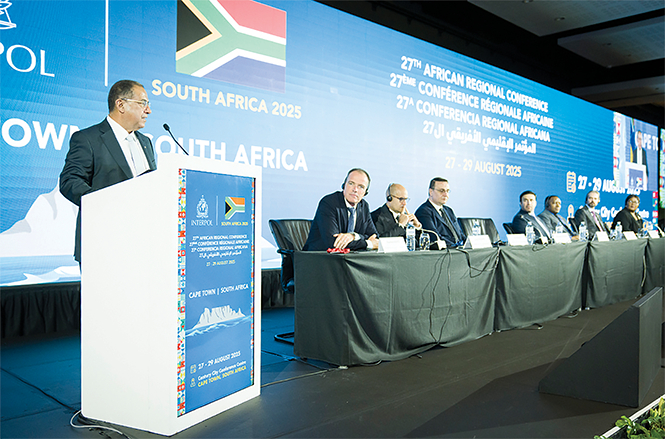
ORGANISED CRIME POSES SERIOUS THREAT TO PEACE, STABILITY
CAPACITY: Transnational crime was evolving at alarming speed, National Commissioner Fannie Masemola tells delegates at Interpol conference…
By Monk Nkomo
Africa was facing a critical time including geoTransnational organised crime weakened institutions, fuelled corruption, undermined development and corroded governance, Acting Police Minister, Professor Firoz Cachalia said this week.
Speaking at the three-day 27th African Regional Interpol Conference in Cape Town, Cachalia said transnational crime diverted resources and impeded the police’s ability to achieve the aspirations of Agenda 2063 of the African Union as well as the Sustainable Development Goals of the United Nations.
The high-level gathering is hosted by the South African Police Services led by Cachalia together with police deputy ministers, Dr Polly Boshielo and Cassel Mathale. The conference is being attended by a number of police chiefs including President of Interpol, Major General Ahmed Naser Al-Raisi and the Secretary General of Interpol, Valdecy Urquiza. The guests were welcomed by National Commissioner Fannie Masemola.
Cachalia stressed that organised crime remained one of the most serious threats to peace, stability and development across Africa and beyond. Dealing with these crimes demanded a collective, concerted and focused effort.
“Its manifestations are diverse: drug trafficking, human trafficking, illicit firearms, cybercrime, wildlife crime, money laundering, and terrorism, to name but a few of the most threatening.” These crimes transcended borders, exploited technological advances and undermined the security of people and the integrity of respective States and economies.
“We are all mindful, particularly, that syndicated crime today is not static. The evolving nature of criminal activities, the emergence of new trends and the use of sophisticated technologies by criminal networks compel us to constantly adapt our responses,” Cachalia said.
It required robust strategies and the concrete implementation of agreed actions at national, regional, continental and global levels, said Cachalia who also called for the swift eradication of corruption within the law enforcement agencies to ensure success in dealing with crime and having leaders with integrity within the system.
“We are gathered here to generate solutions that are both strategic and pragmatic; solutions that can be implemented effectively within our countries and within the frameworks of our regional and continental organisations’’, Cachalia said.
The conference is expected to underscore South Africa’s commitment to regional and international cooperation in combating transnational organised crime, terrorism and other emerging threats.
It is also expected to result in concrete agreements on strengthening regional responses while also serving as a platform for the exchange of best practices and the deepening of law enforcement partnerships.
Masemola said the conference offered the police chiefs the opportunity to assess crime threats and emerging trends and to strengthen Interpol’s core capabilities to reinforce the global policing cooperation that linked Africa to all 193 member countries of Interpol.
Transnational organised crime, he added, was evolving at alarming speed.
“Whether it is drug trafficking, human trafficking, cybercrime, firearms smuggling, vehicle theft or illegal mining, these crimes exploit borders, weaken governance, fuel corruption and destabilise communities. Behind every crime statistic lies a story of lives shattered, families broken, and communities robbed of their peace.”
Cachalia said South Africa’s participation in the conference was firmly rooted in the country’s constitutional values and long-term national vision. “Our Constitution enshrines the right of every person to safety and security, and it compels the State to protect and uphold these rights. Our engagement in regional and global security cooperation is, therefore, not only a matter of international solidarity but also an essential component of our domestic agenda.”
“Whether it is drug trafficking, human trafficking, cybercrime, firearms smuggling, vehicle theft or illegal mining, these crimes exploit borders, weaken governance, fuel corruption and destabilise communities. Behind every crime statistic lies a story of lives shattered, families broken and communities robbed of their peace.”
Masemola said those present and representing their countries were bound by a shared responsibility to confront the complex and evolving challenges of transnational crime that undermined peace, prosperity and the rule of law.
‘Track dirty money’

Africa was facing a critical time, including geopolitical instability, climate change and supply chain disruptions – a crisis that was being exploited by increasingly agile criminal networks which were finding new opportunities to infiltrate, thrive and destabilise the continent.
This was said by Mahmoud Ali Youssouf, chairperson of the African Union Commission in a statement read by Ambassador Jalel Chelba, executive director of Afripol, at the 27th African Regional Conference of Interpol attended by police chiefs from across Africa held in Cape Town since Wednesday and closed today.
“Transnational organised crime continues to plan, target and strike while becoming stronger and interconnected’’, Youssouf said. The conference was an ideal setting for exchanges and reinforced their shared determination to build a more secure future for all. These meetings always provided them with an opportunity to strengthen their relationships, foster cooperation and build the capacity of law enforcement agencies.
Youssouf added that terrorism in Africa persisted and was transforming from the Sahel-Saharan region to the Horn of Africa where armed groups were exploiting local tensions, relying on criminal revenues and seeking to expand their influence. Joint Afripol-Interpol and regional operations such as Neptune and Usalama, had helped neutralize several cells and protect hundreds of victims but the challenge remained immense.
Youssouf said over the course of the conference, criminal network delegates would discuss crucial topics related to strengthening police cooperation in Africa, including the fight against transnational organized crime, the development of national and regional capacities and cooperation between continental and international mechanisms such as Afripol and Interpol.
This was a critical time. Recent joint operations organiSed by Afripol and Interpol illustrated both the scale of the threats posed by transnational organized crime and the effectiveness of international police cooperation.
They demonstrated the importance of coordinated action to disrupt criminal networks and protect communities across the African continent.


